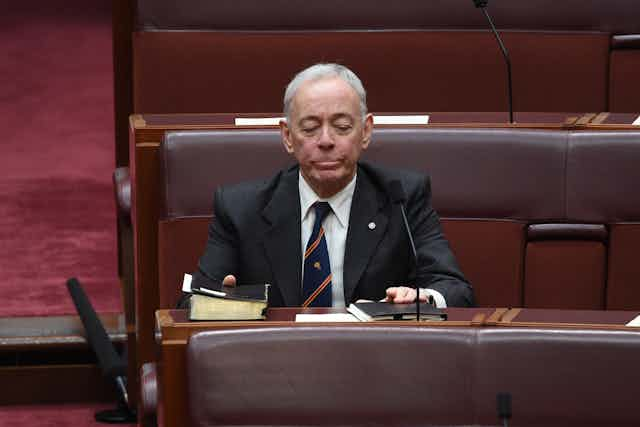The High Court, sitting as the Court of Disputed Returns, unanimously decided on Wednesday that former Family First senator Bob Day was not eligible to be elected to the upper house. The case demonstrates that courts adopt a strict approach to determining whether candidates are disqualified from standing for election.
What was the case about?
The issue before the court was whether Day was disqualified from being elected because of Section 44(v) of the Constitution. This says anyone who “has any direct or indirect pecuniary interest in any agreement with the public service of the Commonwealth” is ineligible to be elected to federal parliament.
This section’s purpose is to prevent conflicts of interest. The theory is people who have financial dealings with the government might not act independently as MPs. There is an exception covering cases where the interest exists only because a person is a member of a company with more than 25 shareholders.
The case was to some extent academic: Day resigned from the Senate even before hearings began, when his building company went into liquidation.
However, it was still necessary to decide whether he was eligible to stand for election in the first place. It was also necessary to decide how the resulting vacancy should be filled.
The issue of whether Day had had an interest in a contract with the Commonwealth was complex. Day occupied electorate offices owned by a company, Fullarton Investments, which leased the offices to the Commonwealth Department of Financial Services. In turn, the Commonwealth provided them to Day as part of his parliamentary entitlements.
The problem arose because the Day family trust had previously owned the building, which it then sold to Fullarton, lending Fullarton the money to buy it. The trust guaranteed a bank loan to Fullarton, which was secured by a mortgage over the property, and also serviced the mortgage.
Fullarton was expected to pay to the Day trust rent, which Fullarton received from the Commonwealth in exchange for the Day trust servicing the loan. The Day trust would then use that money to service the loan. If no rent was received, then the fact the Day trust had guaranteed the loan would mean it was liable to the bank.
In practice, Day paid the rent himself. But that did not remove the problem because – on paper at least – the Day trust had a financial interest in the lease Fullarton had with the Commonwealth.
The question the court had to decide was whether these intricate financial arrangements meant Day had a “direct or indirect” interest in Fullarton’s contract with the Commonwealth.
What did the court find?
The court adopted a strict interpretation of Section 44(v).
It held the section was designed not only to prevent the Commonwealth from using contracts an MP held to pressure them, but also to ensure an MP would not try to benefit from such agreements, or put themselves in a position where their financial interests conflict with their duty to the people they represent.
The court pointed out that MPs are supposed to question and criticise government on behalf of the people, and hold government to account. So, if an MP has a financial interest in a contract with the government, there is a risk they might not be rigorous in doing this.
The court said that because Section 44(v) prohibits not only direct but also indirect interests in agreements, the fact the Day trust stood to receive the rent, even via an indirect route, meant Day himself had an interest in the lease.
For this reason, his election was invalid.
Who will replace Day?
The next issue to be decided was how the resultant vacancy should be filled.
The court had the power to order a recount. How it would be conducted depended on a test in an earlier High Court decision, which was that the method used should reflect:
… the true result of the polling – that is to say, the true legal intent of the voters.
Labor candidate Anne McEwan, who could potentially win the seat depending on how the count was done, argued before the court that because of Day’s high profile, simply allocating his preferences would distort the result. She argued that, if a special count was done, the votes received by Day’s Family First group above the line – and the votes he received below the line – should be ignored.
In other words, McEwan was saying that most of the votes received by the other Family First candidate, Lucy Gichuhi, were received only because Day was on the ballot. McEwan argued that only votes received below the line by Gichuhi should be counted, which would have reduced Gichuhi’s chances of being elected – and enhanced McEwan’s.
The court rejected this argument. It held that to ignore the votes cast for Family First just because Day was a high-profile candidate would be unfair to voters, as it would distort their real intentions. The court held voters would know that if, for any reason, Day was not elected, his votes would flow to Gichuhi.
If that preference flow occurs as expected, the likelihood is Gichuhi will win the seat.
The key importance of the Day case is that courts interpret the eligibility requirements for election strictly. Even the most tenuous financial interest in dealings with the Commonwealth will be enough to disqualify a candidate.

